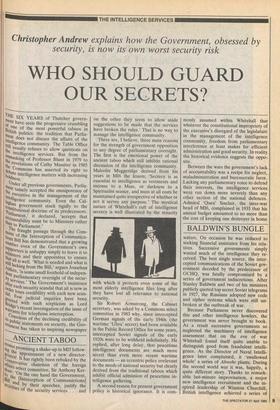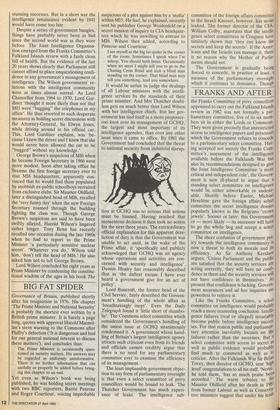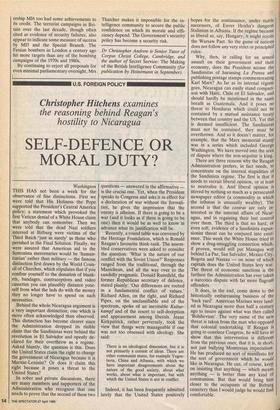THE INTELLIGENCE SERVICES Christopher Andrew explains how the Government, obsessed
by
security, is now its own worst security risk
WHO SHOULD GUARD OUR SECRETS?
l'HE SIX YEARS of Thatcher govern- ment have seen the progressive crumbling of one of the most powerful taboos in British politics: the tradition that Parlia- ment does not discuss the affairs of the intelligence community. The Table Office still usually refuses to allow questions on the intelligence services. But from the ,ttinmasking of Professor Blunt in 1979 to `Be revelations of Cathy Massiter in 1985 the Commons has asserted its right to bunbate intelligence matters with increasing boldness. Under all previous governments, Parlia- rnaent tamely accepted the omnipotence of the executive in the management of the 'intelligence community. Even the Cal- lihan government stuck rigidly to the rstitutional doctrine of its predecessors. Parliament,' it declared, 'accepts that tL.ecuntability must be to Ministers rather
nal) to Parliament.'
,,The fraught passage through the Com- tnus of the Interception of Cornmunica- ,sinns Bill has demonstrated that a growing supporters even of the Government's own ministers is unhappy simply to leave it to '4:lusters and their appointees to ensure si.1! all is well. 'What is needed and what is I." lacking from the Bill,' argues Jonathan tiNtkon, 'is some small foothold of indepen- 4ent parliamentary oversight of the secur- al' services.' The Government's insistence 0,t,et each security scandal that all is now in d'uer loses credibility with each new scan- I:1; Pew judicial inquiries have been jirs'.eted with such scepticism as Lord w'luge's recent investigation of the issue of arrants for telephone interception. sreenscious of the declining credibility of Public statements on security, the Gov- "lent has taken to inspiring newspaper ANCIENT TABOO stories n Promising a shke-p in M I5 irfollow- DY the appointmenta u
of a new dector- cb"isrleralas rig y
It has rightly been rebuked by the afr.servative chairman of the foreign sCalrs select committee, Sir Anthony Ker- b,14`4L: On the one hand the Government, gill he [Interception of Communictions] .and by their speeches, justify the 'avities of the security services . . . and
on the other they seem to allow snide suggestions to be made that the services have broken the rules.' That is no way to manage the intelligence community.
There are, I believe, three main reasons for the strength of government opposition to any degree of parliamentary oversight. The first is the emotional power of the ancient taboo which still inhibits rational discussion of the intelligence community. Malcolm Muggeridge derived from his years in MI6 the lesson: 'Secrecy is as essential to intelligence as vestments and incense to a Mass, or darkness to a Spiritualist seance, and must at all costs be maintained quite irrespective of whether or not it serves any purpose.' The mystical nature of Whitehall's cult of intelligence secrecy is well illustrated by the tenacity with which it protects even some of the most elderly intelligence files long after they have lost all relevance to national security.
Sir Robert Armstrong, the Cabinet secretary, was asked by a Commons select committee in 1983 why, since intercepted German signals of the early 1940s (the wartime 'Ultra' secret) had been available in the Public Record Office for some years, intercepted Soviet signals of the early 1920s were to be withheld indefinitely. He replied, after long delay, that peacetime intelligence documents are much more secret than even more recent wartime documents — an eccentric policy irrelevant to the needs of national security but clearly derived from the traditional taboos which inhibit official admission of peacetime in- telligence gathering.
A second reason for present government policy is historical ignorance. It is com-
monly assumed within Whitehall that whatever the constitutional impropriety of the executive's disregard of the legislature in the management of the intelligence community, freedom from parliamentary interference at least makes for efficient administration and good security. In reality the historical evidence suggests the oppo- site.
Between the wars the government's lack of accountability was a recipe for neglect, maladministration and bureaucratic farce. 'Lacking any parliamentary voice to defend their interests, the intelligence services were run down more severely than any other section of the national defences. Admiral 'Quex' Sinclair, the inter-war head of MI6, complained in 1935 that his annual budget amounted to no more than the cost of keeping one destroyer in home
BALDWIN'S BUNGLE
waters. On occasion he was reduced to seeking financial assistance from his rela- tives. Successive governments simply wasted much of the intelligence they re- ceived. The best single source, the inter- cepted communications of the Soviet gov- ernment decoded by the predecessor of GCHQ, was fatally compromised by a series of government indiscretions. After Stanley Baldwin and two of his ministers publicly quoted top secret Soviet telegrams in 1927, the Russians adopted new code and cipher systems which were still un- broken at the outbreak of war.
Because Parliament never discovered this and other intelligence howlers, the government was never brought to book. As a result successive governments so neglected the machinery of intelligence assessment that on the eve of war Whitehall found itself quite unable to distinguish good from fraudulent intelli- gence. As the Director of Naval Intelli- gence later complained, it 'swallowed whole' a series of Abwehr plants. During the second world war it was, happily, a quite different story. Thanks to remark- able last-minute improvisation, a major new intelligence recruitment and the in- spired leadership of Winston Churchill, British intelligence achieved a series of
stunning successes. But in a short war the intelligence renaissance evident by 1941 would have come too late.
Despite a series of government bungles, things have probably never been as bad since the second world war as they were before. The Joint Intelligence Organisa- tion emerged from the Franks Committee's Falkland Islands review with a fairly clean bill of health. But the evidence of the last 20 years shows clearly that Parliament still cannot afford to place unquestioning confi- dence in any government's management of intelligence. The Wilson governments' re- lations with the intelligence community were at times almost surreal. As Lord Chancellor from 1964 to 1970, Lord Gar- diner 'thought it more likely than not that MI5 were "bugging" the telephones in my office'. He thus resorted to such desperate measures as holding secret discussions with the Attorney-General, Sir Elwyn Jones, while driving around in his official car. This, Lord Gardiner explains, was 'be- cause I knew the driver and I knew that she would never have allowed the car to be "bugged" without my knowledge.'
George Brown's suspicions of MI6 when he became Foreign Secretary in 1966 were more modest. Soon after taking office he became the first foreign secretary ever to visit MI6 headquarters, apparently con- vinced that he would find them populated by snobbish ex-public schoolboys recruited from exclusive clubs. Sir Maurice Oldfield, later a distinguished head of MI6, recalled the 'very funny day' when the new Foreign Secretary roamed through the building fighting the class war. Though George Brown's suspicions are said to have been swiftly allayed, Harold Wilson's lingered rather longer. Tony Benn has recently recalled one occasion during the late 1960s when he had to report to the Prime Minister 'a particularly sensitive nuclear secret'. 'Whatever you do,' Wilson told him, 'don't tell the head of MI6.' He also asked him not to tell George Brown.
Lord Wilson concluded his eight years as Prime Minister by condensing the constitu- tional wisdom of the ages in his book The
BIG FAT SPIDER
Governance of Britain, published shortly after his resignation in 1976. His chapter 'The Prime Minister and National Security' is probably the shortest ever written by a British prime minister. It is barely a page long, quotes with approval Harold Macmil- lan's stern warning to the Commons after Philby's defection ('It is dangerous and bad for our general national interest to discuss these matters'), and concludes thus:
The Prime Minister is occasionally ques- tioned on security matters. His answers may be regarded as uniformly uninformative. There is no further information that can usefully or properly be added before bring- ing this chapter to an end.
Yet even as Wilson's book was being published, he was holding secret meetings with two BBC reporters, Barrie Penrose and Roger Courtiour, voicing improbable suspicions of a plot against him by a `mafia' within MI5. He had, he explained, recently sent his publisher George Weidenfeld on a secret mission of inquiry to CIA headquar- ters which he was unwilling to entrust to MI6. Wilson then added, according to Penrose and Courtiour:
I see myself as the big fat spider in the corner of the room. Sometimes I speak when I'm asleep. You should both listen. Occasionally when we meet I might tell you to go to the Charing Cross Road and kick a blind man standing on the corner. That blind man may tell you something, lead you somewhere.
It would be unfair to judge the dealings of all Labour ministers with the intelli- gence services by the standards of their prime minister. And Mrs Thatcher doubt- less gets on much better than Lord Wilson with her intelligence chiefs. But her gov- ernment has tied itself in a more preposter- ous knot over its management of GCHQ, the largest and most important of its intelligence agencies, than over any other issue since it came to office. By 1981 the Government had concluded that the threat to national security from industrial disrup- tion at GCHQ was so serious that unions must be banned. Having reached that momentous decision it then took no action for the next three years. The extraordinary official explanation for this apparent dere- liction of duty is that the Government was unable to act until, in the wake of the Prime affair, it 'specifically and publicly acknowleged that GCHQ was an agency whose operations and activities are con- cerned with security and intelligence'. Dennis Healey has reasonably described that as 'the daftest excuse I have ever heard a government give for an act of policy'.
Lord Bancroft, the former head of the Civil Service, fairly described the Govern- ment's handling of the whole affair as `breathtakingly inept'. Even the Daily Telegraph found it 'little short of shambo- lic'. The Commons select committee which considered the Government's handling of the union issue at GCHQ unanimously condemned it. A government whose hand- ling of Britain's largest intelligence agency attracts such criticism even from its friends and officials cannot credibly argue that there is no need for any parliamentary committee ever to examine the efficiency of its management.
The least implausible government objec- tion to any form of parliamentary oversight is that even a select committee of privy councillors would be bound to leak. The Thatcher Government has much experi- ence of leaks. The intelligence sub-
committee of the foreign affairs committee in the Israeli Knesset, however, has never leaked. The former director of the CIA, William Colby, maintains that the intelli- gence select committees in Congress have similarly shown that 'they can know the secrets and keep the secrets'. If the Amer' icans and the Israelis can manage it, there is no reason why the Mother of Parlia- ments should not.
The Government is gradually being forced to concede, in practice at least, a measure of the parliamentary oversight which it continues to denounce. Though
FRANKS AND AFTER
the Franks Committee of privy councillors appointed to carry out the Falkland Islands review in 1982 was not formally a par- liamentary committee, five of its six mem' bers sit in either the Lords or Commons. They were given precisely that unrestricted access to intelligence papers and personnel
which the Government refuses to concede to a parliamentary select committee. Hav ing accepted not merely the Franks Coin' mittee's assessment of the intelligence available before the Falklands War but also its recommendations designed to give the Joint Intelligence Committee 'a more critical and independent role', the Govern• ment is now ill-placed to argue that a standing select committee on intelligence would be either unworkable or undesir• able. Shortly before Easter, Michael Heseltine gave the foreign affairs select committee the secret intelligence dossier
popularly known as the Belgrano 'crown jewels'. Sooner or later, this Government or — more likely — its successor will have to go the whole hog and accept a select committee on intelligence. The sheer confusion of government pol- icy towards the intelligence community is now a threat to both its morale and its efficiency. As Sir Anthony Kershaw argues: 'Unless Parliament and the public
are satisfied that the security services are acting correctly, they will have no confi• dence in them and the security services will
not have confidence in themselves.' At present that confidence is lacking. Govern' ment assurances and ad hoc inquiries are powerless to restore it.
Like the Franks Committee, a select committee on intelligence would probablY reach a more reassuring conclusion. Intelli' gence failures (real or alleged) invariably become public before intelligence succes' ses. For that reason public and parliamew tary attention inevitably focuses on the
failures rather than the successes. But a select committee with access to secret as well as public evidence would probablY find much to commend as well as in criticise. After the Falklands War Sir Brian Tovey, then director of GCHQ, sent 'high, level' congratulations to all his staff. 'Never, he told them, 'has so much praise been accorded.' The warm tributes to Sir Maurice Oldfield after his death in 1981 from former Labour as well as Conserve' tive ministers suggest that under his lead'ii
ership MI6 too had some achievements to its credit. The terrorist campaigns in Bri- tain over the last decade, though often cited as evidence of security failures, also appear to indicate some measure of success by MI5 and the Special Branch. The Fenian bombers in London a century ago hit more targets than any of the bombing campaigns of the 1970s and 1980s.
By continuing to reject all proposals for', even minimal parliamentary oversight, Mrs
Thatcher makes it impossible for the in- telligence community to secure the public confidence on which its morale and effi- ciency depend. The Government's security policy has become a security risk.
Dr Christopher Andrew is Senior Tutor of Corpus Christi College, Cambridge, and the author of Secret Service: The Making of the British Intelligence Community (for publication by Heinemann in September).




















































 Previous page
Previous page